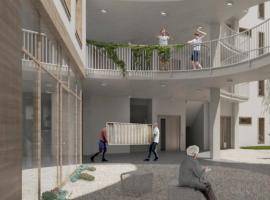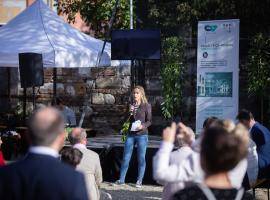The 'soft' elements of the E-Co-Housing project
In order to put the communal and sustainability criteria - soft elements - into practice, the relevant consortium partners have worked intensively since the beginning of the project. The work was coordinated by Habitat for Humanity Hungary. Beside that the Municipality of Zugló, the Budapest University of Technology and Economics, the ABUD Advanced Building & Urban Design Ltd. and the Greendependent Institute Nonprofit Ltd participated.
The collaboration started in 2018 with a focus group survey and joint planning where the team worked with a group appropriate to the target population of the future tenants. The results of this work partly determined the final shape of the architectural plans and provided relevant information for the design of future mentoring programs.
The next big milestone for the working group in the first half of 2019 was the compilation of an expert proposal for a special tenant selection scheme through a combination of quota and point system that seeks to achieve the multi-level need of bringing residents into the house on a social basis, but also create a diverse group which is fundamental in establishing the conditions of a future co-housing community. The plan is to select the tenants only 3-4 months before their move-in date to help motivate the new residents to participate in community-building, mentoring programs, and to minimize dropouts during the process.
In the summer and second half of 2019 the team developed the mentoring programs and guidebooks.
The Mentoring Programme for Community Development aims to create a cohesive, co-housing like community capable of acquiring the knowledge and skills needed in society, courtesy-based use of certain services, sharing based cost optimization, and developing crisis strategies based on good neighborhood relationships. Through this program, the community of the house can thus partly replace the social network, the lack or underdevelopment of which is characteristic of the low-status groups, which usually causes significant disadvantages of life management and problem-solving opportunities.
The Economic Resilience Mentoring Programme will help the tenants through 3 modules.
Household Management covers individual decisions, household budgets, and debt management topics. Under this program, we provide knowledge that households need to apply in the long term to actually improve their financial situation. That is why it is especially important - also in other modules - to properly follow-up this mentoring program.
To support the interested residents further developing their Economic independence, core business development and management competencies are passed on to them. They can learn business modeling and planning practices, which can lead to problem- and customer-value oriented thinking. The module provides support for the development of assets, premises, human resources, and helps market entry, and helps them meet legal requirements.
The third module, Community Economic Relations, aims to develop a barter system based on multilateral relationships, where residents can learn about the basics of barter, its framework and various options, but the final form and rules are developed by themselves with the mentors’ support.
The two guidebooks produced by the working group also aim to assist tenants on a daily basis throughout the project and beyond. The Regenerative Urban Living Guidebook provides support to residents to develop a lifestyle that is environmentally friendly, which allows them to create sustainable homes and housekeeping. The Guide to Living in a Co-Housing provides useful practices for community living in a variety of situations. Both guidebooks encourage residents to apply the theories in practice, discuss issues that arise with other members of the community, and share their experiences.















